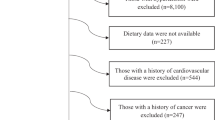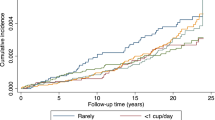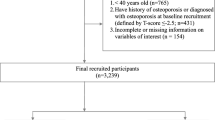Abstract
By a cross-sectional epidemiology study, we attempted to correlate the consumption of tea and/or health supplements, living habits and socio-demographic factors to the prevalence of hypertension among Singaporean Chinese residents. Singaporean Chinese residents aged ⩾40 years were randomly selected and interviewed face-to-face by clinical research assistants. Hypertension was defined as measured systolic blood pressure at least 140 mm Hg and/or diastolic blood pressure at least 90 mmHg or self-reported history/treatment for hypertension. The prevalence of hypertension among the whole investigated population (N=1184, 58.27% females) was 49.73% and the prevalence increased to 66.47% in the sub-population aged ⩾60 years. High risk of hypertension was associated with age ⩾60 years (odds ratio (OR): 4.15–4.19, P<0.01), obesity (body mass index >25 kg m−2, OR: 2.10–2.11, P<0.01), family history of hypertension (OR: 2.69–2.76, P<0.01), diabetes history (OR: 2.29–2.33, P<0.01), hyperlipidemia history (OR: 1.79–1.80, P<0.01), male (OR: 1.56–1.59, P<0.01) and coffee intake (OR: 1.44–1.46, P<0.05). In contrast, drinking green tea at least 150 ml per week was associated with lower hypertension risk (OR: 0.63, 95% confidence interval (CI): 0.43–0.91, P<0.05). Drinking combination of green tea and British tea was associated with higher reduction in the risk of hypertension (OR: 0.58, 95% CI: 0.39–0.85, P<0.05). This cross-sectional study suggests that consumption of tea, especially green tea and British tea, was associated with lowering the risk of hypertension. On the other hand, consumption of coffee could be a risk factor of hypertension. These findings may provide useful information for health promotion to reduce risk of hypertension and warrant further study to confirm and elucidate such association.
This is a preview of subscription content, access via your institution
Access options
Subscribe to this journal
Receive 12 digital issues and online access to articles
$119.00 per year
only $9.92 per issue
Buy this article
- Purchase on Springer Link
- Instant access to full article PDF
Prices may be subject to local taxes which are calculated during checkout
Similar content being viewed by others
References
Organization WH. A global brief on Hypertension—Silent killer, global public health crisis, World Health Organization: 20 Avenue Appia, 1211 Geneva 27, Switzerland, 2013.
Lip GY, Frison L, Halperin JL, Lane DA . Comparative validation of a novel risk score for predicting bleeding risk in anticoagulated patients with atrial fibrillation: the HAS-BLED (hypertension, abnormal renal/liver function, stroke, bleeding history or predisposition, labile INR, elderly, drugs/alcohol concomitantly) score. J Am Coll Cardiol 2011; 57: 173–180.
Aburto NJ, Hanson S, Gutierrez H, Hooper L, Elliott P, Cappuccio FP . Effect of increased potassium intake on cardiovascular risk factors and disease: systematic review and meta-analyses. BMJ 2013; 346: f1378.
Okin PM, Kjeldsen SE, Julius S, Hille DA, Dahlof B, Devereux RB . Effect of changing heart rate during treatment of hypertension on incidence of heart failure. Am J Cardiol 2012; 109: 699–704.
Bakris GL, Sarafidis PA, Weir MR, Dahlof B, Pitt B, Jamerson K et al. Renal outcomes with different fixed-dose combination therapies in patients with hypertension at high risk for cardiovascular events (ACCOMPLISH): a prespecified secondary analysis of a randomised controlled trial. Lancet 2010; 375: 1173–1181.
World Health Organization. Global status report on noncommunicable diseases 2010. WHO: Geneva, Switzerland, 2011.
Piccini RX, Facchini LA, Tomasi E, Siqueira FV, Silveira DS, Thume E et al. Promotion, prevention and arterial hypertension care in Brazil. Rev Saude Publica 2012; 46: 543–550.
Wong TY, Mitchell P . The eye in hypertension. Lancet 2007; 369: 425–435.
Han JA, Frishman WH, Wu Sun S, Palmiero PM, Petrillo R . Cardiovascular and respiratory considerations with pharmacotherapy of glaucoma and ocular hypertension. Cardiol Rev 2008; 16 (2): 95–108.
Epidemiology & Disease Control Division MoH, Singapore. National Health Survey 2010. Epidemiology & Disease Control Division, vol. 2010. Ministry of Health, Singapore: Singapore, Singapore, 2010.
Malhotra R, Chan A, Malhotra C, Ostbye T . Prevalence, awareness, treatment and control of hypertension in the elderly population of Singapore. Hypertens Res 2010; 33: 1223–1231.
Zhen Y-S . Tea: Bioactivity and Therapeutic Potential vol. 17. CRC Press: 11 New Fetter Lane, London EC4P 4EE, 2002.
Bogdanski P, Suliburska J, Szulinska M, Stepien M, Pupek-Musialik D, Jablecka A . Green tea extract reduces blood pressure, inflammatory biomarkers, and oxidative stress and improves parameters associated with insulin resistance in obese, hypertensive patients. Nutr Res 2012; 32: 421–427.
Ihm SH, Jang SW, Kim OR, Chang K, Oak MH, Lee JO et al. Decaffeinated green tea extract improves hypertension and insulin resistance in a rat model of metabolic syndrome. Atherosclerosis 2012; 224: 377–383.
Yang HY, Yang SC, Chao JC, Chen JR . Beneficial effects of catechin-rich green tea and inulin on the body composition of overweight adults. Br J Nutr 2012; 107: 749–754.
Zhou CJ, Huang S, Liu JQ, Qiu SQ, Xie FY, Song HP et al. Sweet tea leaves extract improves leptin resistance in diet-induced obese rats. J Ethnopharmacol 2013; 145: 386–392.
Sundaram R, Naresh R, Shanthi P, Sachdanandam P . Modulatory effect of green tea extract on hepatic key enzymes of glucose metabolism in streptozotocin and high fat diet induced diabetic rats. Phytomedicine 2013; 20: 577–584.
McKay DL, Chen CY, Saltzman E, Blumberg JB . Hibiscus sabdariffa L. tea (tisane) lowers blood pressure in prehypertensive and mildly hypertensive adults. J Nutr 2010; 140: 298–303.
Mozaffari-Khosravi H, Ahadi Z, Barzegar K . The effect of green tea and sour tea on blood pressure of patients with type 2 diabetes: a randomized clinical trial. J Diet Suppl 2013; 10: 105–115.
Forman JP, Scott JB, Ng K, Drake BF, Suarez EG, Hayden DL et al. Effect of vitamin D supplementation on blood pressure in blacks. Hypertension 2013; 61: 779–785.
Li Z, Ye R, Zhang L, Li H, Liu J, Ren A . Folic acid supplementation during early pregnancy and the risk of gestational hypertension and preeclampsia. Hypertension 2013; 61: 873–879.
Trimarco V, Cimmino CS, Santoro M, Pagnano G, Manzi MV, Piglia A et al. Nutraceuticals for blood pressure control in patients with high-normal or grade 1 hypertension. High Blood Press Cardiovasc Prev 2012; 19: 117–122.
Neri I, Monari F, Sgarbi L, Berardi A, Masellis G, Facchinetti F . L-arginine supplementation in women with chronic hypertension: impact on blood pressure and maternal and neonatal complications. J Matern Fetal Neonatal Med 2010; 23: 1456–1460.
Yang TY, Wei JC, Lee MY, Chen CM, Ueng KC . A randomized, double-blind, placebo-controlled study to evaluate the efficacy and tolerability of Fufang Danshen (Salvia miltiorrhiza as add-on antihypertensive therapy in Taiwanese patients with uncontrolled hypertension. Phytother Res 2012; 26: 291–298.
Pan C, Huo Y, An X, Singh G, Chen M, Yang Z et al. Panax notoginseng and its components decreased hypertension via stimulation of endothelial-dependent vessel dilatation. Vascul Pharmacol 2012; 56: 150–158.
Charan J, Biswas T . How to calculate sample size for different study designs in medical research? Indian J Psychol Med 2013; 35: 121–126.
World Health Organization. BMI Classification, 2004 http://apps.who.int/bmi/index.jsp?introPage=intro_3.html. In.
Khan N, Mukhtar H . Tea and health: studies in humans. Curr Pharm Des 2013; 19: 6141–6147.
Stangl V, Lorenz M, Stangl K . The role of tea and tea flavonoids in cardiovascular health. Mol Nutr Food Res 2006; 50: 218–228.
Hu G, Jousilahti P, Nissinen A, Bidel S, Antikainen R, Tuomilehto J . Coffee consumption and the incidence of antihypertensive drug treatment in Finnish men and women. Am J Clin Nutr 2007; 86: 457–464.
Zhang Z, Hu G, Caballero B, Appel L, Chen L . Habitual coffee consumption and risk of hypertension: a systematic review and meta-analysis of prospective observational studies. Am J Clin Nutr 2011; 93: 1212–1219.
Hodgson JM, Puddey IB, Burke V, Beilin LJ, Jordan N . Effects on blood pressure of drinking green and black tea. J Hypertens 1999; 17: 457–463.
Bhardwaj P, Khanna D . Green tea catechins: defensive role in cardiovascular disorders. Chin J Nat Med 2013; 11: 345–353.
Huang WY, Davidge ST, Wu J . Bioactive natural constituents from food sources-potential use in hypertension prevention and treatment. Crit Rev Food Sci Nutr 2013; 53: 615–630.
Li F, Ohnishi-Kameyama M, Takahashi Y, Yamaki K . Tea polyphenols as novel and potent inhibitory substances against renin activity. J Agric Food Chem 2013; 61: 9697–9704.
Acknowledgements
The research was sponsored by a seed grant from the Singapore College of Traditional Chinese Medicine (STCM 2013-1). The authors are grateful for the support and help from Chung Hwa Medical Institution, Singapore. The support and research assistance from the students of the STCM are highly appreciated.
Author information
Authors and Affiliations
Corresponding author
Ethics declarations
Competing interests
The authors declare no conflict of interest.
Rights and permissions
About this article
Cite this article
Li, W., Yang, J., Zhu, X. et al. Correlation between tea consumption and prevalence of hypertension among Singaporean Chinese residents aged ⩾40 years. J Hum Hypertens 30, 11–17 (2016). https://doi.org/10.1038/jhh.2015.45
Received:
Revised:
Accepted:
Published:
Issue Date:
DOI: https://doi.org/10.1038/jhh.2015.45



